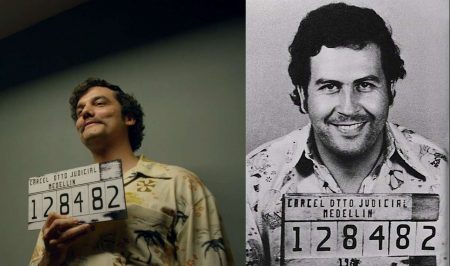It’s 2015, and from Hollywood’s Black Mass (2015) to TV’s The Americans (FX, 2013-), Halt and Catch Fire (AMC, 2014-) and Show Me a Hero (HBO, 2015) – the 1980s as an era have become one of the hottest cultural sujets de jour. Netflix’s current blockbuster series Narcos continues in that mould, and introduces a particular spin on it: during the first few on-screen seconds, we read:
“Magical realism is defined as what happens when a highly detailed, realistic setting is invaded by something too strange to believe. There is a reason Magical Realism was born in Colombia.”
[Introductory text to Narcos, S01E01]
Produced and directed by José Padilha, the show traces the slowly-escalating drug war between the American Drug Enforcement Administration (DEA) and the Colombian Medellín Cartel during the 1970s and 1980s. The show blends the semi-fictional reenactment of a ‘too good to be true’-Gangster plot – hence the opening quote – with quite a bit of docu-drama verisimilitude (The Verge went so far as to call it a “blend of The Wire and Goodfellas”). In addition, and similar to e.g. Mad Men (AMC, 2007-15), it also uses archival footage to frame its narrative, thus e.g. easily blending Reagan era news footage and presidential addresses with the fictional main part of the show.
With the narrative’s diegesis spread over more than one and a half decades and – similar to series such as Boardwalk Empire – centred on the rise and fall of an iconic figure against the backdrop of recent US (and trans-/international) history, it might well be labelled a prime example of contemporary Period Drama.
The series is narrated from the point-of-view of DEA agent Steve Murphy, who frames the narrative with a ‘seen-it-all’-attitude voice-over. In this way, we are introduced to the massive problem brought into the country via a tidal wave of imported cocaine that hit the US during the 1970s and 1980s, and the multilateral, transnational consequences this import business had on an inter-American scale. Murphy delivers his personal story in a pars-pro-toto style, always blending his own experience with the larger decisions and movements made by the DEA as an organisation. In addition, his narration provides context in order to frame the developments within the larger cultural and political climate, such as the Cold War fear of communist influences, or the day-to-day difficulties of tracing the drug cartel’s movements due to technological limitations of the time. Parallel to that, the voice-over also introduces the rise of Pablo Escobar from a third-person perspective, thus creating a dialogue of sorts when tracing the diachronic developments of their eventual paths crossing: “At the time, Pablo was just a blip on my radar … I didn’t know I was about to be a blip on his…” [Voice-over from NarcosS01E02, min 16:40.]

Figure 2: Pablo Emilio Escobar Gaviria: Narcos’ version (Wagner Moura, left) vs. police archive mugshot (right)
Often, though, Murphy’s voice-over recedes and lets the narrative unfold by itself. These are the parts that, in my opinion, are the most intriguing – mainly, because of the show’s linguistic features: During these parts, Narcos turns into a Spanish-language production that relies on subtitles in order to convey its story to its non-Spanish audiences. The overwhelming majority of plot threads on Pablo Escobar and the larger socio-political background on Colombia of that time (an estimated three quarters of the whole series) are therefore told in Colombian Spanish, adding, as Karen Busse has recently pointed out, a purported “sense of authenticity and documentary evidence”. Busse’s argument that the language is watered down by Escobar actor Wagner Moura’s noticeable Brazilian accent and thus rendered unbelievable apparently holds true for a many Colombian viewers. On the other hand, Netflix has definitely taken a risk with its decision to heavily rely on subtitles, since mass US audiences are usually assumed to be wary of textual over-use in TV shows. Supposedly, this kind of risk might well be softened by Netflix’ long-term strategy of catering to a loyal international art house niche that is more than willing to watch shows with subtitles. This part of the audience is provided with a constant influx of foreign-language and art house movies and TV shows that include celebrated works such as Dancer in the Dark (von Trier, 2000), The White Ribbon (Haneke, 2009) and in-house adaptations and productions such as House of Cards and now, Narcos.
One might also argue that by acknowledging the intercultural difficulties inherent in the highly complex topic of international drug trade on a variety of levels the concept of Narcos is a bold move taken by Netflix. On a narrative level, Narcos intensifies the experience of communication breakdown between two government bodies that are forced to collaborate on the transnational war against drugs. And on a level of distribution, the show’s linguistic features increase its potential international reach particularly toward the Spanish-speaking Latin American market which largely exceeds the Colombian example that Busse refers to.
All in all, Narcos is a new take on the Escobar story that, through its transnational and bilingual pseudo-documentary style, offers a new and interesting remediation of the 1980s as an era. It transcends the standard US-American experience that since the 80s has proven a global export hit and, in a way mirroring the drug invasion into the US, for many other nations felt like a cultural invasion. Narcos is part of a recent development, a change of focus away from a predominantly US-centred perspective (other Netflix examples may include Lilyhammer (2013), Sense8 (2015) and Club de Cuervos (2015). The obvious goal is to become more appealing to international audiences in order to help the Netflix plan of full global expansion. If and how attempts such as Lilyhammer and Narcos will translate into an even wider reach of Netflix as a global player and producer of trans- and international TV shows – a player that has itself disrupted the established television landscape and is invading national market after national market via its global mode of production and distribution – remains to be seen.
Tobias Steiner is a part-time PhD candidate at the Dept. of English and American Studies, Universität Hamburg, Germany. His proposed thesis is focusing on the role of Television Drama as a Medium of Cultural Memory. Parallel to that, he works as a research fellow at Universität Hamburg’s Universitätskolleg and has been teaching American Television history at the university’s Dept. of Media and Communications. Tobias currently acts as postgraduate (YECREA) representative of ECREA’s Television Studies section and is enthusiastic about all things Complex Television, both as a fan and a Cultural Studies-focused academic.




